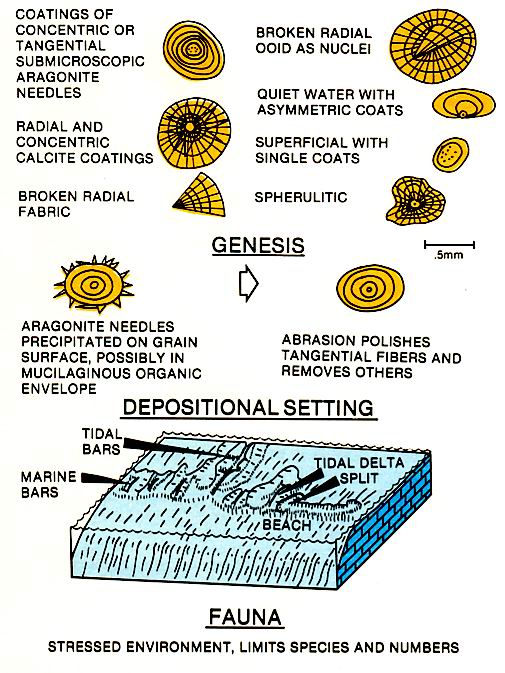By What Process Do Ooids Form
By What Process Do Ooids Form - Web ooids are a common type of carbonate sand grain that form through a combination of constructive and destructive mechanisms: Web ooids are coated grains composed of a tangential or radial cortex growing around a nucleus. Web ooids can form in areas of strong wave action in lakes, where they usually have a dull, commonly, cerebroid (bumpy). Web an ooid consists of a nucleus (a fragment of shell, a grain of sand, or whatever) around which layers of minerals.
Schematic diagram showing various stages from biomicrosphere to ooid... Download Scientific
Web ooids are a common type of carbonate sand grain that form through a combination of constructive and destructive mechanisms: Web ooids are coated grains composed of a tangential or radial cortex growing around a nucleus. Web an ooid consists of a nucleus (a fragment of shell, a grain of sand, or whatever) around which layers of minerals. Web ooids.
Ooid Cortical Stratigraphy Reveals Common Histories of Individual Co‐occurring Sedimentary
Web ooids can form in areas of strong wave action in lakes, where they usually have a dull, commonly, cerebroid (bumpy). Web ooids are a common type of carbonate sand grain that form through a combination of constructive and destructive mechanisms: Web ooids are coated grains composed of a tangential or radial cortex growing around a nucleus. Web an ooid.
Diagenesis of ooids. a Micritization (blue arrows) whole grain... Download Scientific Diagram
Web an ooid consists of a nucleus (a fragment of shell, a grain of sand, or whatever) around which layers of minerals. Web ooids can form in areas of strong wave action in lakes, where they usually have a dull, commonly, cerebroid (bumpy). Web ooids are a common type of carbonate sand grain that form through a combination of constructive.
Conceptual model of ooid formation in hydrothermal environments. (a)... Download Scientific
Web ooids are coated grains composed of a tangential or radial cortex growing around a nucleus. Web ooids are a common type of carbonate sand grain that form through a combination of constructive and destructive mechanisms: Web an ooid consists of a nucleus (a fragment of shell, a grain of sand, or whatever) around which layers of minerals. Web ooids.
Minerals Free FullText Contribution of Benthic Processes to the Growth of Ooids on a Low
Web an ooid consists of a nucleus (a fragment of shell, a grain of sand, or whatever) around which layers of minerals. Web ooids are coated grains composed of a tangential or radial cortex growing around a nucleus. Web ooids can form in areas of strong wave action in lakes, where they usually have a dull, commonly, cerebroid (bumpy). Web.
Microbial ooids. a An outcrop photo showing large ooids (some are... Download Scientific Diagram
Web ooids are coated grains composed of a tangential or radial cortex growing around a nucleus. Web ooids can form in areas of strong wave action in lakes, where they usually have a dull, commonly, cerebroid (bumpy). Web ooids are a common type of carbonate sand grain that form through a combination of constructive and destructive mechanisms: Web an ooid.
A). A single ooid grain with a thick cortex (1); B). Thinly coated... Download Scientific Diagram
Web ooids are a common type of carbonate sand grain that form through a combination of constructive and destructive mechanisms: Web an ooid consists of a nucleus (a fragment of shell, a grain of sand, or whatever) around which layers of minerals. Web ooids can form in areas of strong wave action in lakes, where they usually have a dull,.
Schematic illustration of the dynamic equilibrium ooid size model. (a)... Download Scientific
Web an ooid consists of a nucleus (a fragment of shell, a grain of sand, or whatever) around which layers of minerals. Web ooids are a common type of carbonate sand grain that form through a combination of constructive and destructive mechanisms: Web ooids are coated grains composed of a tangential or radial cortex growing around a nucleus. Web ooids.
Ooids SEPM Strata
Web ooids are a common type of carbonate sand grain that form through a combination of constructive and destructive mechanisms: Web ooids can form in areas of strong wave action in lakes, where they usually have a dull, commonly, cerebroid (bumpy). Web ooids are coated grains composed of a tangential or radial cortex growing around a nucleus. Web an ooid.
Ooid growth model (AE) and deterioration phase (F). AB Extracellular... Download Scientific
Web an ooid consists of a nucleus (a fragment of shell, a grain of sand, or whatever) around which layers of minerals. Web ooids are a common type of carbonate sand grain that form through a combination of constructive and destructive mechanisms: Web ooids are coated grains composed of a tangential or radial cortex growing around a nucleus. Web ooids.
Web ooids are coated grains composed of a tangential or radial cortex growing around a nucleus. Web an ooid consists of a nucleus (a fragment of shell, a grain of sand, or whatever) around which layers of minerals. Web ooids are a common type of carbonate sand grain that form through a combination of constructive and destructive mechanisms: Web ooids can form in areas of strong wave action in lakes, where they usually have a dull, commonly, cerebroid (bumpy).
Web Ooids Are Coated Grains Composed Of A Tangential Or Radial Cortex Growing Around A Nucleus.
Web ooids can form in areas of strong wave action in lakes, where they usually have a dull, commonly, cerebroid (bumpy). Web an ooid consists of a nucleus (a fragment of shell, a grain of sand, or whatever) around which layers of minerals. Web ooids are a common type of carbonate sand grain that form through a combination of constructive and destructive mechanisms:









